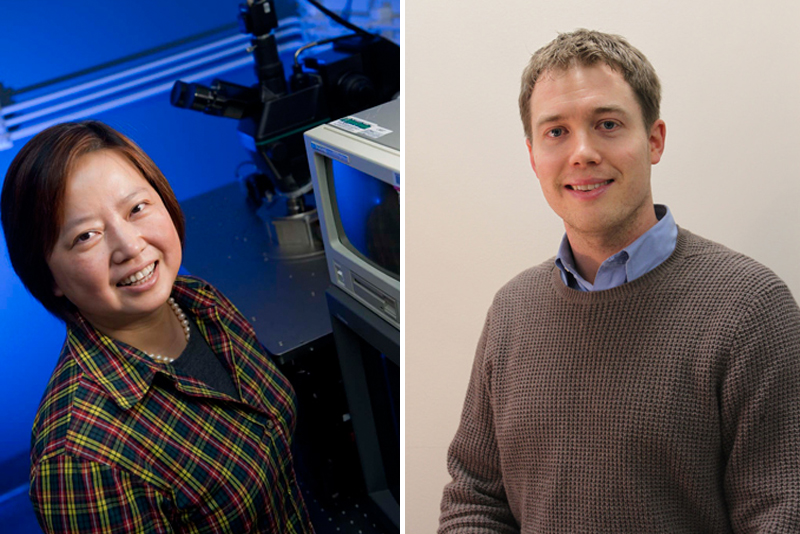Faculty Receive First Schlumberger-BU Research Grants
Graduate fellowships to support innovation in oil and gas extraction

Xin Zhang, a professor in Boston University’s College of Engineering (ENG), and James C. Bird, an ENG assistant professor, have received the first Schlumberger-Boston University Research Fellowship grants, which pair BU graduate students with Schlumberger researchers to pursue early-stage research in technical areas of potential importance to Schlumberger. Approved by a committee comprised of BU and Schlumberger researchers, each one-year grant provides stipend and fees for one graduate fellowship per faculty member.
The new program is jointly sponsored by BU and the Cambridge-based Schlumberger Doll Research Center (SDR), which conducts scientific research to invent and develop future Schlumberger products and services in sensor physics, mathematics and modeling, reservoir geosciences, mechanics and materials science, and carbon dioxide mitigation and sequestration.
”Drs. Zhang and Bird are two of the most exciting innovators in the college,” says Catherine Klapperich, ENG professor and associate dean for research and technology development. “Both projects have the potential to positively impact energy extraction and environmental stewardship.”
Zhang received her Schlumberger-BU grant for a proposal to collaborate with SDR researchers in advancing a mid-infrared (Mid-IR) microfluidic sensor. Microfluidic systems enable rapid chemical analysis and testing with very small sample volumes, a capability that’s critical for timely detection and analysis of poisonous and/or corrosive constituents during oil and gas extraction. Engineers typically perform such analyses based on a sample’s optical response when subject to light at different wavelengths, but Zhang has a better idea.
“One can enhance the performance of this technique by using microfluidic sensors equipped with infrared sources and detectors, and analyzing multiple samples in parallel,” she says. “Miniaturization and mass-production of such low-cost systems may not only benefit the oil and gas industry but also aid in environmental monitoring and remediation.”
Bird’s award will support BU-SDR research seeking to improve upon oil industry tests that measure the wettability of rock in a reservoir. Wettability is the degree to which one fluid will spontaneously spread along a solid surface when surrounded by a different fluid, a phenomenon that plays an important role in oil recovery. When fluids that don’t mix (such as oil and water) are present in a reservoir, the surface tension between them can lead to capillary pressures which, depending on the rock’s wettability, will either help or hinder oil recovery. The most commonly applied test, the Amott test, is very time consuming and inadequate for making quick decisions.
“The aim of this project is to better understand why two immiscible fluids that are confined to reservoir channels with curvature spontaneously rearrange in a particular fashion,” says Bird. “We expect that some of the faster dynamics during this rearrangement will be related to the underlying wettability. A fundamental understanding of this relationship will enable us to design wettability tests that are both accurate and rapid; the results of these tests can guide engineers as they determine the most efficient oil recovery procedures for a given well.”
Comments & Discussion
Boston University moderates comments to facilitate an informed, substantive, civil conversation. Abusive, profane, self-promotional, misleading, incoherent or off-topic comments will be rejected. Moderators are staffed during regular business hours (EST) and can only accept comments written in English. Statistics or facts must include a citation or a link to the citation.